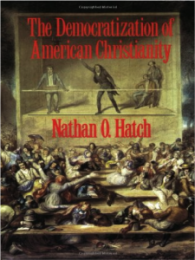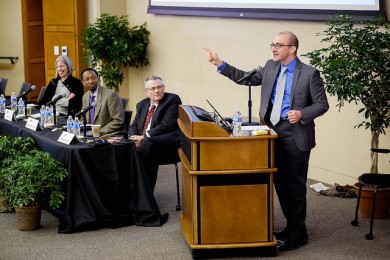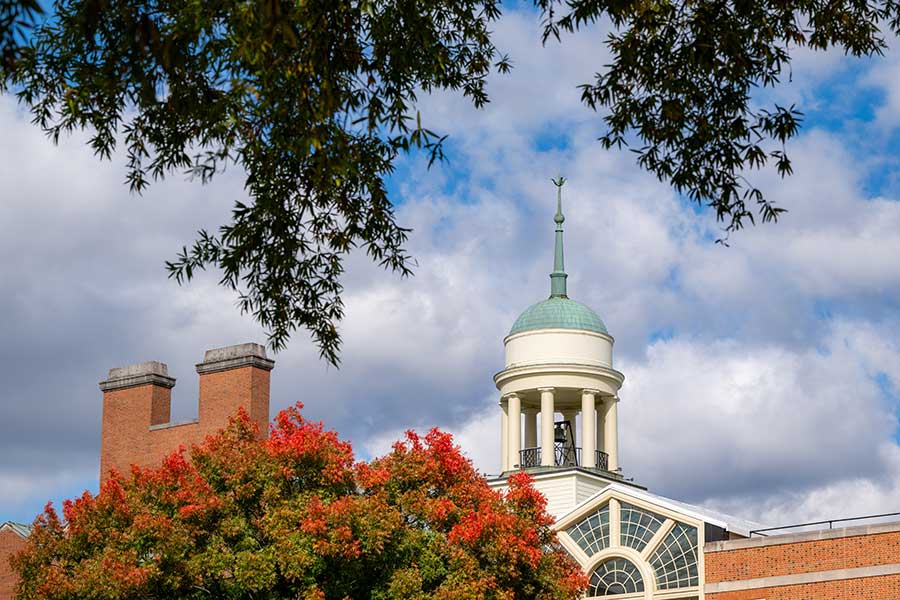President Nathan Hatch: Historian
Not every college president has written a book that is required reading for undergraduate and graduate students across the country a quarter century after its publication.
But, Wake Forest President Nathan Hatch’s “The Democratization of American Christianity” still has an important place in the classroom and continues to shape discussions about American history, religion and culture.
In a half-day symposium held on campus Feb. 6, distinguished scholars from Harvard, Yale, Duke and several other universities gathered to reflect on the enduring influence of the book and engage in critical discussions.
Described as one of the three most significant books on American Christianity in the last century, Hatch’s award-winning work argues that the empowerment of ordinary people wrought by the American Revolution has been as central to the history of American religion as it has been to American political history. Author and religion scholar Stephen Prothero named it one of the five best books on religion and politics in a 2012 Wall Street Journal article.
“People often ask why America is so much more ‘religious’ than her Western European counterparts,” said Jay Ford, professor and chair of Wake Forest’s religion department and one of the organizers of the symposium. “Dr. Hatch’s book remains significant because it uncovers the very seeds, planted in the early republic, to the rich vibrancy of American Christianity still evident today.”
After a welcome and introduction, two discussions led by a panel of scholars addressed the influence and impact of the book and highlighted more recent scholarship and critical assessments of it.
Harry Stout, Jonathan Edward Professor of American Christianity at Yale University wrote the following in his remarks for the conference, “He [Hatch] was creative and innovative in his approach to these two topics: Christianity and the American Republic.”
Several of the visiting scholars commented on the groundbreaking nature of Hatch’s work.
Catherine Brekus, a Harvard Divinity School professor who has taught the book to her students for the past 22 years, said, “This book has shaped the entire way I have thought about American Christianity.”
Senior religion major Adam McDuffie said the work of Nathan Hatch, Mark Noll, and other panelists provided the framework and inspiration for his studies, including his honors project focused on Baptists and the American religious experience.
“The opportunity to hear scholars of such a high-caliber unpack this work and its impact on the field is truly incredible,” McDuffie said. “Hatch’s work has been truly paradigmatic in its effect on the study of American religious history.”
Dean of Wake Forest’s School of Divinity Gail O’Day described the impact of Hatch’s book when it was first published 25 years ago. “When Nathan Hatch published this landmark book, American religious studies were still largely focused on the ‘official’ religion of Protestant groups that immigrated from Britain and Europe — their doctrines and institutions and authoritative authors. Hatch opened up scholarship to religious movements that were flowing outside the bounds of religious authority, by showing how popular religious practices such as camp meetings, revivals, and traveling preachers offered new Americans a way of understanding their experience and expressing their religious beliefs and feelings.”
Several School of Divinity students attended the symposium.
 “As a divinity student that looks to pursue further studies in American Religious History, the symposium offers a wonderful opportunity to hear from some of the top scholars in the field,” said third-year School of Divinity student Andrew Garner. “Hatch’s work has dramatically influenced the field of antebellum religious history, and I find myself returning to this work often for papers and assignments.”
“As a divinity student that looks to pursue further studies in American Religious History, the symposium offers a wonderful opportunity to hear from some of the top scholars in the field,” said third-year School of Divinity student Andrew Garner. “Hatch’s work has dramatically influenced the field of antebellum religious history, and I find myself returning to this work often for papers and assignments.”
Other scholars, such as Grant Wacker, Gilbert T. Rowe Professor of Christian History at Duke Divinity School, said, in addition to its content, he asks students to read Hatch’s book as an example of how to write…to show them “the importance of writing beautifully.”
In the concluding session, President Hatch shared how the diary of a Massachusetts minister led him to explore the stories of the grassroots preachers and other ordinary people featured in his book.
“The farmers, artisans, slaves and women in Nathan’s book had ideas and those ideas had a profound effect on American culture,” Brekus said.
The event was sponsored by the Wake Forest School of Divinity, the departments of history and religion, the Humanities Institute, and the Office of the Provost.
Categories: Awards & Recognition, Research & Discovery, University Announcements
Media Contact
Wake Forest News
media@wfu.edu
336.758.5237



